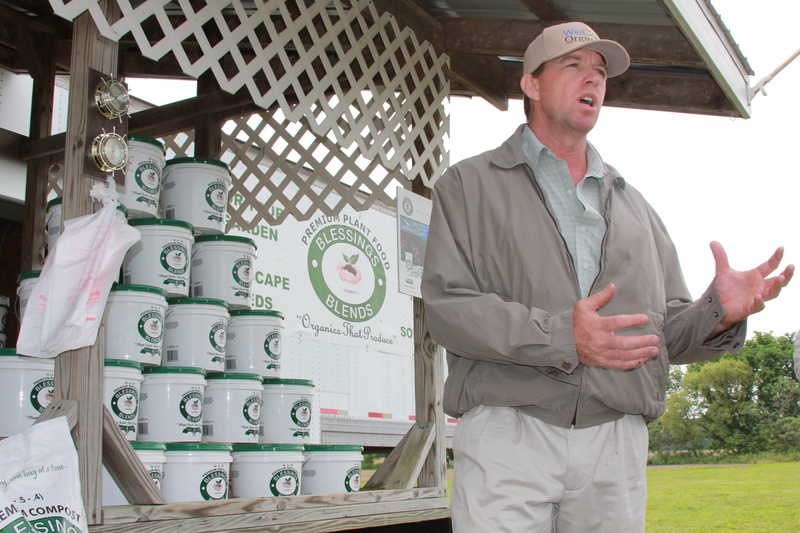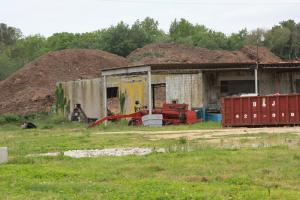Bruce Blessing's compost operation at crossroads
Some days the winds that blow across Kim Bennett's farm south of Milford are fine.
On others, she said, the smell is so bad it permeates the farmhouse on Draper Road she's shared with husband Steve for 30 years.
She doesn't dare hang out laundry on those days or the foul smell will cling to the fresh laundry, she said.
"It depends on which way the wind is blowing that you smell it," Bennett said.
With 150 acres of farmland, the Bennetts are part of a Sussex County farming community that stretches east of Route 1 toward Fowler Beach. Wide-open spaces are punctuated with chicken houses and farmettes.
Seven years ago, farmer and businessman Bruce Blessing started a compost business at the flower farm he operates in the farming community.
The Department of Natural Resources and Environmental Control issued a permit in 2005 allowing his compost business to receive chicken manure, chicken offal, hatchery waste, food processing waste and sewer sludge from wastewater treatment facilities. A permit issued a year earlier allows Blessing to operate a second business, spraying waste grease from restaurants and poultry processing plants on farmland approved for that use.
Fertilizers, chicken houses and close proximity to low-tide marshland have long generated a fecund smell in the area, but about two years ago, a pervasive, putrid smell was added to the mix, Bennett said.
"We never had a problem with this before," she said.
The smell brought back memories of her childhood, when her family lived in Japan.
An open sewer ditch lay near her home, and it's a stench that's unmistakable, she said.
"I've never forgotten that smell, and I know that's what I was smelling," Bennett said.
Most of the waste Blessing has accumulated on his compost farm comes from chicken manure, carcasses and eggs from chicken farms, he said. Though permitted to accept sewer sludge from wastewater treatment plants, he said he received only a small amount from a plant in Milton, and he stopped bringing it to his compost business in 2011. He said he doesn't expect to accept any wastewater treatment sewage in the future.
But it's not just the smell that has neighbors concerned.
The number of flies has increased exponentially. Former state Rep. George Carey attributes the flies to Blessings' land-application business. Carey said he pulled about 700 acres of his land out of the program because he was concerned about what was being sprayed on his fields.
|
Timeline 2004- Bruce Blessing receives permit authorizing him to operate a land treatment system for the agricultural utilization of waste 2005- Blessing receives permit for distribution and marketing of sludge or sludge products, which includes organic materials from chicken farms 2010 – Blessing receives violation for his storm water plan and pays DNREC $8,671 2010-2011 – DNREC receives odor and fly complaints from residents living near Blessings compost operation Dec. 31, 2011 – Blessings permit for distribution and marketing of sludge or sludge products expires March 19, 2012 – Secretary's Order outlines improvements needed with deadlines and per day fines of $50-$500 if improvements are not met April 18, 2012 – More than 60 residents attend DNREC public hearing to voice concerns over fly and odor problems in the area |
"As a farmer, it is important to know what is being placed on the land, and in this case we could not take the chance of applying a material that contained many unknown ingredients," he said.
Five years ago, after DNREC permitted Blessing to spray some of Carey's fields with grease waste, Carey said he went with former DNREC Secretary John Hughes to one of Carey's fields on Benson Road. The flies were so bad after they drove onto the property that Carey said they would not get out of the truck. Flies completely covered the windshield, and they had to run the wipers in order to see, he said.
From 2005 to mid-2010, DNREC received only a couple of fly and odor complaints from areas near Blessing's operations. But complaints rose significantly in the 18-month period before Blessing's compost distribution and marketing permit was up for renewal in 2011, said Robert G. Underwood, program manager Surface Water Discharges Section Division of Water.
To ensure the problems would be fixed, Underwood said, DNREC let his composting permit expire Dec. 31, 2011.
It's unusual for DNREC to allow a permit to expire; permits are usually renewed so there's no break in operation, he said. DNREC works with businesses to help them reach compliance, Underwood said.
"We told him here's what we're hearing; here's what we're seeing; here's what we're smelling; and we need to fix it," he said. "I've been down there at 8 o' clock at night and smelled smells that were unacceptable."
Building an industry
Blessing chalks the complaints up to the growing pains of a new industry. He said he's done everything DNREC has asked him to do, but the rules are constantly changing. The Sussex County native whose family has been in the farming business for more than 100 years vacillates from tearful recollections to angry remonstrations when recounting everything he has gone through to build up his business.
"This is something I was encouraged to do by officials because they understood waste removal was going to be a problem," he said.
Today's permit requirements to distribute and market products made from waste materials are a far cry from what they were in 2005 when Blessing received his first permit for his pilot compost program, he said.
Blessing said he's accommodated DNREC's mandates all along.
"The game changed in the process, and we adapted very quickly," he said.
When DNREC told him to put his finished compost in lined troughs, he said he complied. When they told him to put groundwater-monitoring wells on his property, he said he built four at deeper depths than required because he doesn't want to contaminate the water. When DNREC told him to put a berm around his property to make sure runoff did not pollute a neighboring stream that flows into the Delaware Bay, he said he again obliged.
Now, DNREC has told him to put yard waste and wood chips – used in the composting process – on impervious surfaces and cover his finished compost in order to receive his new distribution and marketing permit. Blessing said he'll do what they say.
DNREC's Underwood said there's been some clarification of the language in the permit to make sure there's no misunderstanding, but the regulations from which the permit is drafted have not changed.
In Blessing's case, improvement is needed in stormwater management, Underwood said.
"Any kind of stormwater that comes in contact with his compost material – whether it's the pre-compost material or finished compost material – should not be leaving the site," Underwood said.
To address the stormwater issue, Blessing has built plastic-lined bunkers and is in the process of moving material onto that surface.
"I recognize I need infrastructure," Blessing said. "Regulation has caught up with the industry. I'm creating a whole new industry, and it's come with challenges."
Time's up
Blessing said most of his problems started after he received a DNREC violation notice in December 2010 for illegally discharging stormwater on his property. He did not contest the fine; he paid a $7,540 penalty and reimbursed DNREC $1,131 for the agency's costs.
Blessing said he pumped out a mud puddle with a truck marked "sewage only" and DNREC subsequently cited him. The citation states he discharged the material about 50 feet from a wetland, and the discharge may have contained high levels of nutrients and bacteria based on a sample gathered at the site.
A resulting secretary's order required him to improve the business' stormwater control and operate his compost production in enclosed areas with concrete flooring.
Throughout 2011, Blessing said DNREC and officials from the federal Environmental Protection Agency considered his compliance violation; by November, he notified the poultry processing plants he contracted with and told them he was going to let his permit expire.
"You can't be in business for three or four years and all of a sudden in one year – if it takes two years to make the product – totally remove all that, just wham, like that," he said. "I was told by my consultant that if I put in monitoring wells and it wasn't having environmental impact, that the material would be able to stay until we sold it the following spring."
Blessing's permit for his composting business expired Dec. 31, 2011, prohibiting him from accepting any new materials for composting.
Blessing bristles when recounting the months leading up to his permit expiration, characterizing DNREC officials as "having coffee and donuts" while he was going through "holy f****** hell," he said. Still, he said when his permit expired, that allowed him to get out of a contract with the poultry industry that was becoming costly.
During a downturn in the local poultry industry in 2010, farmers added more surplus eggs to the waste, resulting in heavier and wetter loads because of the egg yolks, he said. Composting requires a drying process to make the finished product, and wetness lengthens the process and adds costs, he said. Rising fuel costs also cut his profit margin.
By canceling the contract with poultry integrators and walking away from an estimated $1 million, Blessing said, he'll have more control over what he receives instead of simply taking what the processing plants give him.
DNREC also is modifying Blessing's land-application permit, which allows him to spray approved farmland with grease-trap waste collected from restaurants and dissolved chicken fat collected from Perdue, Mountaire and Pet Poultry Products.
The change requires Blessing's company, Isdell Sanitation and Pumping Service, to add lime to the waste cocktail it sprays on fields and till the mixture into the soil within two hours of application, Underwood said.
Previously, land-application permits did not set a time limit; they only required the ground be tilled in a timely manner, he said.
"Nobody's ever been required to do that before," Underwood said, but DNREC has required the changes in answer to the large number of resident complaints.
Changes to the land-application permit would go into effect June 1, although the permit does not expire until June 30, 2015, he said.
Questions raised at hearing
A DNREC public hearing held April 18 in Dover drew about 60 residents who voiced concerns over the compost and land application business.
Karen Moore was one of those in attendance. She operates a vegetable stand on the highway a few miles away from Blessing's compost farm. Moore said she's not against the compost business, but the flies and odors have been difficult to bear.
"If he was doing this right, it would be a good thing, but he's not," she said.
She questions whether DNREC has the community's best interest at heart.
"You think your state will protect you, but when it comes to billions of dollars, it's a different story," Moore said, referring to the Delmarva poultry industry.
Sussex County Councilwoman Joan Deaver, who serves the eastern Sussex area where the compost business is located, said she's received many calls from constituents complaining about odors and flies.
She said she thinks DNREC let some of the permit requirements slide from the beginning. If the agency had been diligent, the number of fly and odor complaints would have been lower, she said.
"I think DNREC's been turning away when they should've been taking care," Deaver said.
DNREC's Underwood disagrees. He said the 2012 Secretary's Order requiring Blessing to fix his stormwater violations was the culmination of a series of actions taking by the agency since 2010.
The order signed by both DNREC Secretary Collin O'Mara and Blessing includes hard deadlines for improvements to the compost facility with fines ranging from $50 to $500 per day for each violation.
"Between the violation and him purposely letting his permit expire so he can manage his material better, I think the department has been working in a very forward manner to address the concerns," Underwood said.
Sussex raises zoning issue
Sussex County recently became the latest government entity involved in Blessing's compost business when it issued a zoning violation notice against the two parcels of land on which the business operates. Blessing said he is leasing the property with the intention of buying it. One parcel is about 17 acres owned by Frank Draper; it sits on a site that once was a commercial canning business. The other is about 23 acres of farmland owned by Francis Drury.
Both parcels are currently zoned AR1 – an agriculture, residential designation – and have been so since county zoning began in 1968, said Susan Isaacs, chief zoning inspector for the county. Commercial use probably was permitted since the cannery was in operation when zoning laws were made, Isaacs said.
"There was a nonconforming business there, and he thought it was OK to do business there," she said.
Blessing said he thought commercial zoning was in place in 2002; when he went to county government in 2005, he said it was his understanding there was no objection to his compost business.
"Nothing was brought to my attention," he said.
Blessing said he has started the process to receive conditional use approval from the county to operate his businesses on both parcels.
Isaacs said it's not unusual for business owners to think they have a permitted use for their property, only to find out that they need a conditional use. She said it may take about four months before county council considers the application.
Bound and determined
All the adversity and time spent bringing his business into compliance has made Blessing more determined than ever to make his product a success.
"It's made me that much hungrier to sell it," he said.
A selection of plastic tubs and big bags of Blessings Blend join brightly colored flowers on sale at Blessing's roadside stand on northbound Route 1.
Emblazoned with the slogan "Restoring the bay, one bag at a time," there are four types of compost and fertilizer mixtures depending on a soil's needs. The dry, odorless material is remarkable for the way it absorbs nutrients and prevents runoff into local waterways, he said.
Blessing said he's sold 5,000 units of the product and a total of 10,000 tons this year, including bulk deliveries, to areas outside of the peninsula such as New Jersey.
In other words, he said, he's taking the waste that nobody here wants, and he's moving it out of the watershed. The Delmarva poultry industry needs his compost business, and there's enough waste for 10 compost facilities to operate successfully, he said.
"The opportunity is huge. I can't keep up with the demand," he said. "Our biggest natural resource in Delaware isn't oil, it's chicken s***."
Without his compost business helping process waste, Blessing said, the state and Sussex County run the risk of losing the poultry business to states that are lobbying for them and offering lucrative incentives.
Blessing said he's convinced his compost business will thrive despite the setbacks he's been dealt. He's poised to take his business further with innovations and facilities, such as completely enclosing the operation, similar to the way European companies process compost, he said. To eliminate the facility's carbon footprint, Blessing said, he's exploring a heating system that channels high temperatures produced from compost piles and provides a heat source for the entire facility.
With a sense of pride, he said he hasn't taken a dime of public money. It's all been privately funded and will continue to be so, he said.
Blessing said industry experts have told him that he's doing it right because he's building the product first.
"You build the product because you have to sell the product. If you can't sell it, there's no need to build the facility unless it's being subsidized by the state," he said.
Blessing said he sees a future where the innovative compost system he develops will be used in other states or countries throughout the world.
"Two things – and I hate to be rude. We as a society generate waste. We eat, and we s***. And you want someone else to do the dirty work. I did the dirty work to see if I could do it, and we turned it into a great product," he said.
Melissa Steele is a staff writer covering the state Legislature, government and police. Her newspaper career spans more than 30 years and includes working for the Delaware State News, Burlington County Times, The News Journal, Dover Post and Milford Beacon before coming to the Cape Gazette in 2012. Her work has received numerous awards, most notably a Pulitzer Prize-adjudicated investigative piece, and a runner-up for the MDDC James S. Keat Freedom of Information Award.



















































